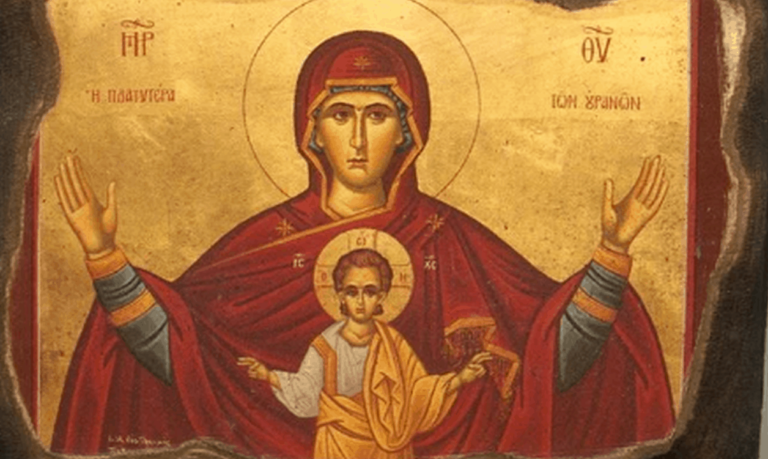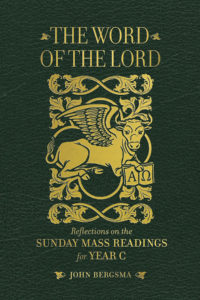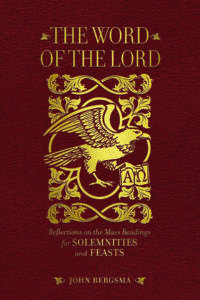By John Bergsma
John Bergsma is Professor of Theology at the Franciscan University of Steubenville. A former Protestant pastor, Dr. Bergsma has authored several books on Scripture and the Catholic faith, including The Word of the Lord series.

January 1 is the Solemnity (Holy Day) of Mary, Mother of God. To call Mary the “Mother of God” must not be understood as a claim for Mary’s motherhood of divinity itself, but in the sense that Mary was mother of Jesus, who is truly God. The Council of Ephesus in 431—long before the schisms with the Eastern churches and the Protestants—proclaimed “Mother of God” a theologically correct title for Mary.
So, far from being a cause of division, the common confession of Mary as “Mother of God” should unite all Christians and distinguish Christian orthodoxy from various confusions of it, such as Arianism (the denial that Jesus was God) or Nestorianism (in which Mary mothers only the human nature of Jesus but not his whole person).
Two themes are present in the readings for this solemnity: (1) the person of Mary, and (2) the name of Jesus. Why the name of Jesus? Prior to the Second Vatican Council, the Octave Day of Christmas was the Feast of the Holy Name, not Mary Mother of God. The legacy of that tradition can be seen in the choice of readings for this solemnity. (The Feast of the Holy Name was removed from the calendar after Vatican II; St. John Paul II restored it as an optional memorial on January 3.)
The shepherds went in haste to Bethlehem and found Mary and Joseph, and the infant lying in the manger. When they saw this, they made known the message that had been told them about this child. All who heard it were amazed by what had been told them by the shepherds. And Mary kept all these things, reflecting on them in her heart. Then the shepherds returned, glorifying and praising God for all they had heard and seen, just as it had been told to them. When eight days were completed for his circumcision, he was named Jesus, the name given him by the angel before he was conceived in the womb. Luke 2:16–21
We note several things: Mary “kept all these things, reflecting on them in her heart.” This is not only a historical indication of where St. Luke is getting his information about these events (so say John Paul II in his Wednesday audience of January 28, 1987 and the Catholic tradition generally), but also a model of the contemplative vocation to which all Christians are called. Especially during this Christmas season, up until the baptism of Jesus, we should carve out some time for quiet prayer, to meditate on the incredible events we celebrate, and to allow their meaning to sink into our hearts.
Then we see the shepherds “glorifying and praising God for all they had heard and seen.” This, too, describes the Christian’s vocation. Pope Francis in particular has called us to return to the aspect of praise and joy that characterizes the disciple of Jesus. Our faith is experiential; it is not just a philosophy. It is an encounter with a person. All of us should know what it means to come into contact with Jesus, to “hear and see” him. In his First Epistle (which we are reading right now in daily Mass), St. John sounds much like the shepherds:
That which was from the beginning, which we have heard, which we have seen with our eyes, which we have looked upon and touched with our hands, concerning the word of life—the life was made manifest, and we saw it, and testify to it, and proclaim to you the eternal life which was with the Father and was made manifest to us—that which we have seen and heard we proclaim also to you, so that you may have fellowship with us; and our fellowship is with the Father and with his Son Jesus Christ. And we are writing this that our joy may be complete. (1 John 1:1–4 RSV2CE)
Observe the connection in this passage with “seeing” and “hearing” and the culmination in proclamation and joy. This is what disciples of Jesus do: they experience Jesus and then proclaim in joy what they have encountered.
Finally, we see the naming of Jesus at his circumcision. Christians no longer practice circumcision because Baptism is the “circumcision of the heart” promised by Moses that surpasses physical circumcision (see Deut 10:16; 30:6; Acts 2:37; Col 2:11–12). Yet at our baptism, the “circumcision of our heart,” we still receive our Christian name.
The name given to Jesus is the Hebrew word y’shua, meaning “salvation.” In the Old Testament, we are more familiar with the name under the form “Joshua,” who was an important type of Christ. Just as Moses was unable to lead the people of Israel into the promised land, but Joshua did, so also Jesus is our new Joshua who takes us into the salvation to which Moses and his covenant could not lead us.
Salvation is now found in the name of Jesus because salvation means to enter into a relationship of childhood with God the Father. It’s not that other great religious leaders (Mohammed, Buddha, Confucius, etc.) claimed to be able to lead us into divine childhood but couldn’t. It’s that they did not even claim to be able to do so. Jesus is unique. So, Jesus says, “I am the way and the truth and the life. No one comes to the Father except through me” (John 14:6). This is not arrogance. Jesus is the only great religious founder in human history to proclaim that God is a Father and we can become his children. This concept of divine filiation is at the heart of the Gospel. In a sense, it can be said to be the heart of the Gospel.
On this solemnity, let us give thanks to God that he has, through Jesus, made a way for us to become his children and receive a new name which he has given us (see Rev 2:17). This intimate, personal relationship with God has been made possible by the cooperation of Mary, who became the mother of the One whose name is Salvation.
You Might Also Like
The Catholic Lectionary guides us through the liturgical year, presenting Old and New Testament readings that together reveal God’s unfolding plan for our salvation. In The Word of the Lord series, biblical scholar Dr. John Bergsma provides commentary alongside each Sunday’s readings.
The Word of the Lord: Reflections on the Sunday Mass Readings for Year C
The Word of the Lord: Reflections on the Mass Readings for Solemnities and Feasts

